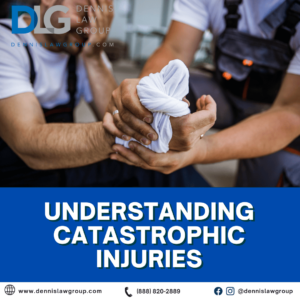In our daily lives, accidents and injuries can occur unexpectedly, sometimes resulting in catastrophic consequences. Understanding catastrophic injuries is crucial for both the individuals affected and those seeking legal recourse on their behalf. This blog post aims to delve into the details of catastrophic injuries, their types, the legal considerations surrounding such cases, and the long-lasting impact they have on individuals’ lives.
 Common Types of Catastrophic Injuries
Common Types of Catastrophic Injuries
When discussing catastrophic injuries, three major types typically come to mind: spinal cord injuries, traumatic brain injuries (TBIs), and amputations.
Spinal Cord Injuries
The spinal cord is a delicate bundle of nerves that runs from the base of the brain through the spinal canal. Any damage to the spinal cord can result in life-altering consequences. Depending on the severity of the injury, individuals may experience partial or complete paralysis, loss of sensation, or impaired bodily functions.
According to the National Spinal Cord Injury Statistical Center, around 17,730 new spinal cord injury cases are reported every year in the United States alone[^1^]. These injuries can occur due to various reasons, such as car accidents, falls, sports injuries, and acts of violence. The impact of a spinal cord injury goes beyond physical limitations, often leading to emotional distress and significant changes in daily life.
For instance, individuals with spinal cord injuries may require assistance with basic activities such as dressing, bathing, and mobility. They may also face financial burdens due to ongoing medical expenses, rehabilitation costs, and the need for assistive devices like wheelchairs and modified vehicles.
Traumatic Brain Injuries (TBIs)
Traumatic brain injuries often occur when there is a sudden jolt, blow, or penetration to the head, resulting in damage to the brain. Unlike less severe head injuries, TBIs have long-lasting consequences that can significantly impact an individual’s cognitive, physical, and emotional well-being.
The severity of TBIs can range from mild to moderate and severe. Mild TBIs, such as concussions, may cause temporary confusion, headaches, and dizziness. However, severe TBIs can lead to cognitive difficulties, memory loss, impaired motor skills, and even permanent disability.
The Centers for Disease Control and Prevention (CDC) estimates that approximately 5.3 million Americans are living with a TBI-related disability[^2^]. These disabilities can impose tremendous challenges on individuals and their families, affecting their ability to work, engage in daily activities, and maintain relationships.
Amputations
Amputations, the removal of a body part, are another form of catastrophic injury that can profoundly impact an individual’s life. Amputations can result from accidents, medical complications, or intentional acts.
Not only do amputations significantly alter an individual’s physical capabilities, but they also have profound psychological and emotional effects. An amputation can lead to feelings of grief, loss, and a struggle to adapt to a new way of life. Rehabilitation and the use of prosthetics or assistive devices play a crucial role in helping individuals regain independence and improve their quality of life.
If you or a loved one has suffered a catastrophic injury, know that the experienced trial lawyers at Dennis Law Group are on your side.
Free consultations are available with Our Catastrophic Injury Lawyers in California
At Dennis Law Group, finding the right Catastrophic Injury lawyer is important to your success.
You can find out whether you have a valid case at no cost to you. That’s because we offer free consultations. To request a free consultation with our team, call (888) 820-2889 or visit https://www.dennislawgroup.com.
